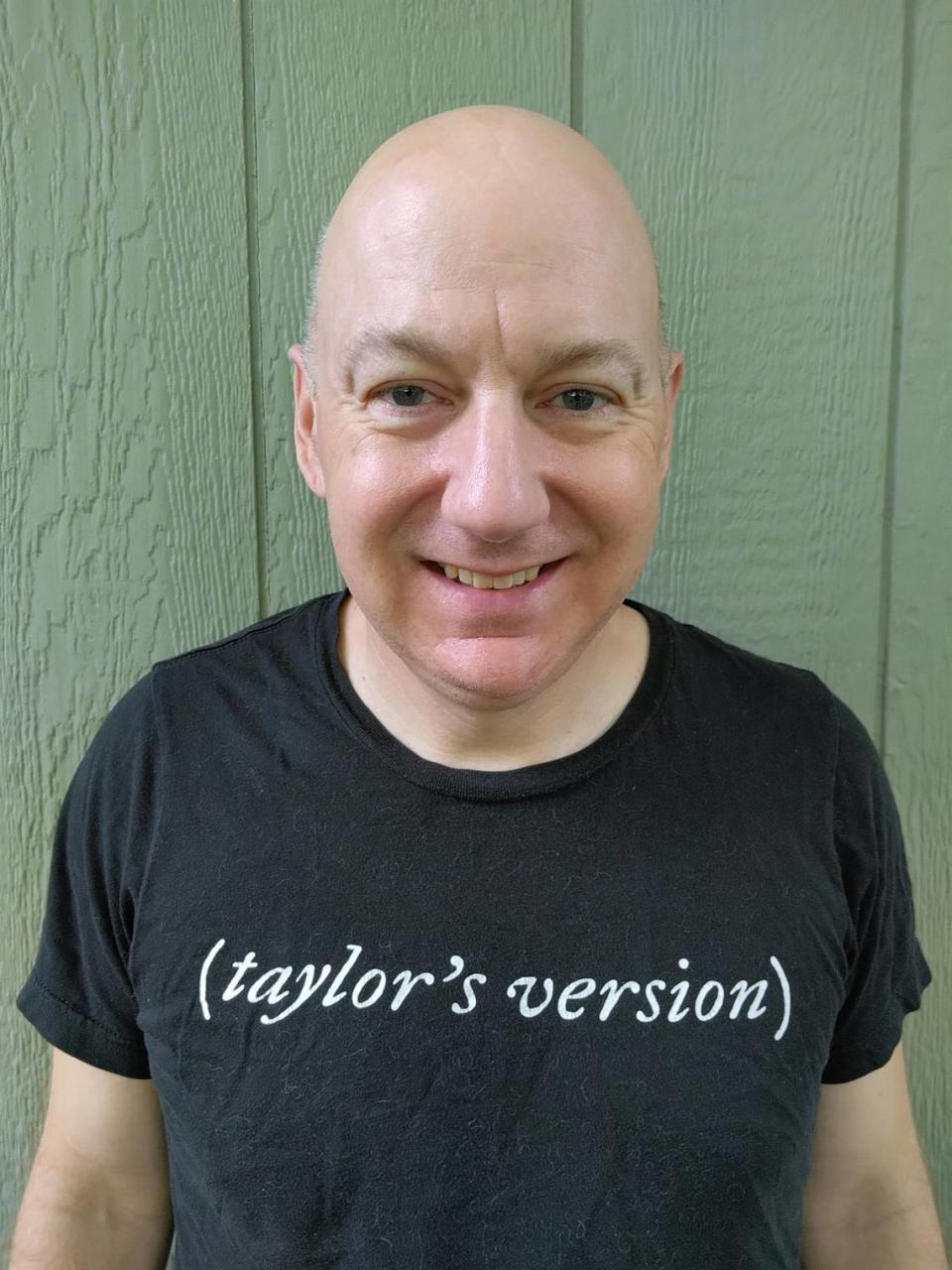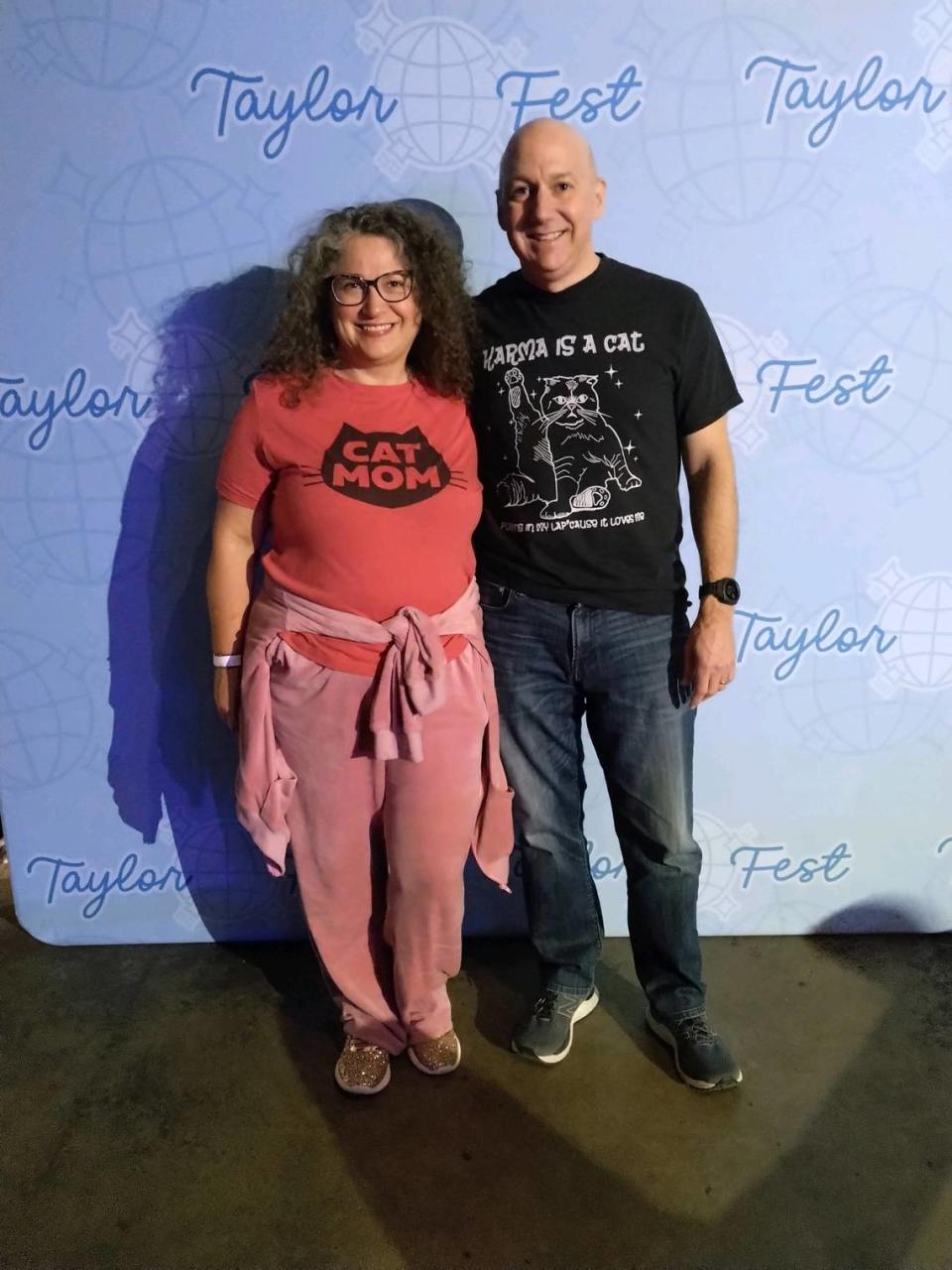Taylor Swift and her fans are such a phenomenon, this KU professor is studying them
- Oops!Something went wrong.Please try again later.
Earlier this month Brian Donovan, a sociology professor at the University of Kansas, made a TikTok to recruit people for his study of Taylor Swift fans. He couldn’t offer them money but promised “we’ll have a good conversation.”
He expected maybe 20 email responses. He got over 2,000 in just a few days.
He unleashed the Swifties.
Donovan is diving deep into their world to see how fandom operates and what people get from it. Thousands of Swift’s fans will pilgrimage to Arrowhead Stadium in July when she plays two shows there on her “Eras Tour.”
The study “will help us gain a better understanding of the social dynamics of fandom and how fandoms produce joy and collective identity,” he pitched on TikTok.
The responses haven’t stopped.
“They keep coming in every day,” he told The Star. “Some of them were sending me basically five-paragraph essays about their involvement in the fandom. And how they bought her album in 2006 and have been a fan since and now their daughter is a fan.
“People have been very generous with their time in sending me very thoughtful, elaborate responses. And I was overwhelmed.”
His TikTok followers know that he too is a Swiftie. At KU, he advises the Taylor Swift Society of fans. And next fall he will teach a class tentatively called “The Sociology of Taylor Swift.”
In this recent TikTok he reintroduced himself as a KU professor who specializes in cultural sociology.
“I’m interested in what sociologists call collective effervescence, of how excitement is created and there is an energy created when folks get together over a shared experience,” Donovan told The Star.
“I’m interested in social capital, what Swifties think is important or valuable within their community, and how status is achieved within that community.
“And I’m also interested in the potential divisions that occur. Because I don’t want to be naive and think that … those divisions that mark our political and social life more generally don’t impact the fandom.”
His research, which he now plans to turn into his fourth book, will add to the ongoing discourse.
“There are discussions about to what extent is fandom essentially consumerism — you buy the Jayhawk gear, you buy the T-shirt,” Donovan said. “And to what extent is fandom quasi-religious, that in a sense in our increasingly secular age fandom is a substitute for a religious connection or religious connection.”
@briandonovan71 Looking for swifties to interview for sociological research! How do fandoms produce joy, identity, inclusion, and boundaries? Contact me at bdonovan@ku.edu #swiftie #swifties #fandom #taylorswift #sociology #research ♬ Dear Reader - Taylor Swift
Men like Taylor, too
Donovan has listened to Swift’s music since 2014 when he bought the “1989” album that featured the mega-hit “Shake It Off.”
“I thought it was a perfect pop album,” he said. “And I still think that.”
“I’m one of those, it’s like a cliche of the older men who got into her deeply in the ‘Folklore’ era, so I kinda fit that stereotype,” he said. “But I’ve been an admirer for a long time, but only recently did I identify as a Swiftie.”
He has a good sense of what makes Swifties different from other fan bases like, say, One Direction’s Directioners or the Greatful Dead’s Deadheads.
“I feel like with the Swifites, the scale is so much more (vast),” he said. And diverse.
“Twelve to 13% of Swifites are Black, which mirrors the population of the U.S. The gender breakdown, even though it is a fandom that is primarily young women, there’s a surprising percentage of men who are avid fans.
“And also … we tend to have a stereotype of Swifties that they are younger, young girls. But there was … a shocking percentage of Gen X and baby boomer Swifties.
“That’s what I think her unique magic is, that she can connect with so many people from diverse backgrounds.”
He’d been thinking about launching a Taylor Swift project for about a year, ever since he started using TikTok, but wasn’t sure “it would have life beyond a journal article.
“What I was seeing, from a sociological perspective, was a rich community with well-developed set of norms and a vibrant culture.
“I’m interested in people’s connection with Taylor Swift. But I’m more interested in Swifties’ connections with other Swifites and how there’s been this created subculture, or shared group culture, that has Taylor Swift at the center for sure but is making meaning beyond what Taylor envisioned.
“And that’s what I think is fascinating. It’s not just, sure we love to talk about Taylor and we love to express our fandom of Taylor. But the bonds that are created laterally among other Swifites is a story that needs to be told.”

The ‘fanilect’ of Swifties
There are Taylor Swift fans … and then there are the Swifties, a distinction Donovan will explore.
The casual admirer “might enjoy her music and listen to it and maybe turn it up when it’s on the radio,” he said. “The Swifties will dive into the meanings of the lyrics and try to make connections across the songs, and participate in the lore and inside jokes, and the shared language of the fandom.”
For instance, Swifties have their own shorthand — what linguists call a “fanilect,” Donovan said.
“She has over 200 songs. And Swifties know those songs so well they can cite those lyrics in different social situations with one another,” he said. “In comments sections on Twitter or on TikTok you will see Swifties talking with one another, primarily using song lyrics as their way of communication.”
Swifties also engage in “clowning,” said Donovan.
“It’s this idea of looking for ‘Easter eggs’ to predict her upcoming professional moves or her new albums.”
Earlier this month Swift fans clowned themselves when they became convinced Swift wrote a rumored anonymous, untitled book coming in July. They pre-ordered so many copies they made the book a bestseller.
It turned out to be a book about K-Pop boy band BTS.
“There’s a self-consciousness about it in that most Swifties know that they’re going to get it wrong and that their predictions are going to be inaccurate,” he said. “But there’s a pleasure in the theorizing. The joy is in the journey, not the destination.”
Swift has encouraged her fans to play sleuth from the beginning of her career “where she would have these Easter eggs embedded in different social media, sometimes in the liner notes of her albums or in little, blink-and-you’ll-miss-it moments in recent videos that are full of meaning. And fans have really responded to this.”

‘A unique genius’
Swift was just a budding sensation when she famously visited KU in 2009 and sat in on a media and society class. She went to Lawrence to see a friend, who was a KU freshman at the time.
Donovan explains the Taylor Swift phenomenon as both fan and impartial researcher. He’s preparing for the Taylor Swift class he’ll teach next semester. The introduction will explore a key question: Why should we take Taylor Swift seriously?
“I’ve thought about this quite a bit,” Donovan said. “One answer that I find unsatisfactory is she’s just brilliant. She is just a unique genius.”
Her power as a cultural force stems from her ability to “cover and jump across so many genres from country, to rock, to dance, folk,” he said. “And as a result of that there are many ways she creates such a wide umbrella, that there are many different entry points to becoming a Swiftie.”
Many of the fans he’s already interviewed for his study have explained how Swift’s lyrics hit close to home as though she has somehow been reading their diaries.
As a songwriter, Donovan said, Swift has a knack for using tiny but very specific details — about a red scarf, the park where she met former beau Joe Alwyn, etc. — that conjure universal feelings.
“Even though I’m not her target demographic, she has a way of taking me back to my 20s … in this way that is eerie,” he said.
Donovan said watching the 2020 Swift documentary “Miss Americana,” in which she discussed her political views for the first time publicly, was “pivotal for the deepening of my fandom. I realized she has a similar set of values that I do.
“And I know she was reluctant, coming from a country music culture to do that.”
For those whose politics are more left-leaning, watching the documentary “will be your gateway drug. But I think there are many gateway drugs to Taylor,” the professor said, offering the following menu.
Like your music on the serious side? Listen to her eighth studio album, “Folklore,” released in 2020.
More pop oriented? Check out “1989” or “Reputation.”
Fans of old-style rock, or country/rock, might enjoy any of her first four albums.
Her “Red” album from 2012 “is her most musically eclectic,” he said.
‘Part of the club’
It happens a lot. Donovan will be wearing one of his Taylor Swift T-shirts in the grocery store and boom, someone stops him and wants to talk Taylor.
At her current concerts, fans know to arrive hours early because merchandise is selling fast — inexplicably one blue crewneck T-shirt in particular.
“It might seem irrational for fans to spend so much money on merchandise, but it’s a way of signaling to other fans that they’re part of the club,” he said.
“I think social media has accelerated this bonding. So Swifties will post their album rankings and song rankings, in addition to of course the lip syncing and dance videos, and those interactions on TikTok in particular feel very intimate because you’re seeing these folks on like a daily basis.”
Come July, when legions of Swifties descent upon Kansas City, “I think we will see fans of all ages and I think we will see mass euphoria,” Donovan predicted.
And lots of friendship bracelets which fans are making and swapping with each other at the concerts. (Alas, the professor flunked bracelet-making.)
He and his wife, Natalie Donovan, have tickets for Swift’s second show at Arrowhead on July 9. His wife is having a dress made that has pictures of Swift’s cats. Donovan is wearing an outfit in the pinks-and-blues color scheme of his favorite Swift album, “Lover,” her seventh studio album from 2019.
He’s going as a fan. And yet, “I have a hard time turning off my sociology brain when I’m doing recreational, fun things. But the flip side is I have a hard time turning off my fandom brain. So I think I’ll be going as both.
“But I will definitely be leaning into my fan identity there. I won’t be doing field work, I won’t be trying to set up interviews. I won’t be trying to do sociology.”

